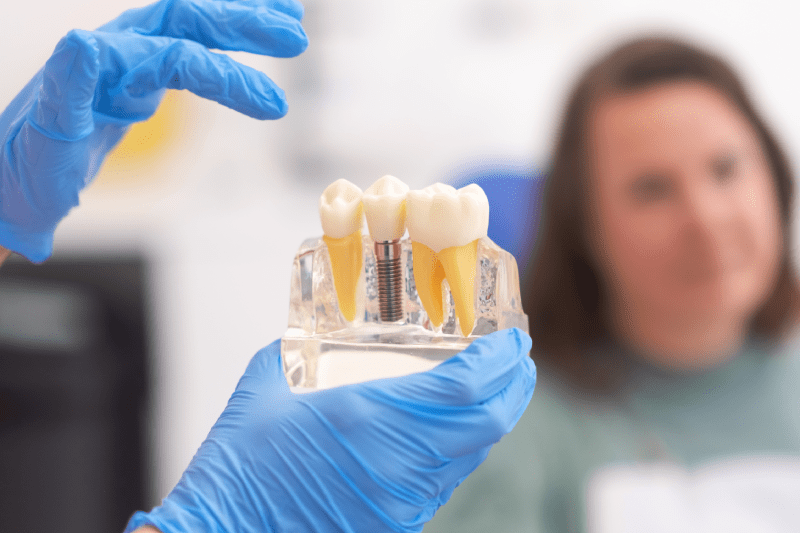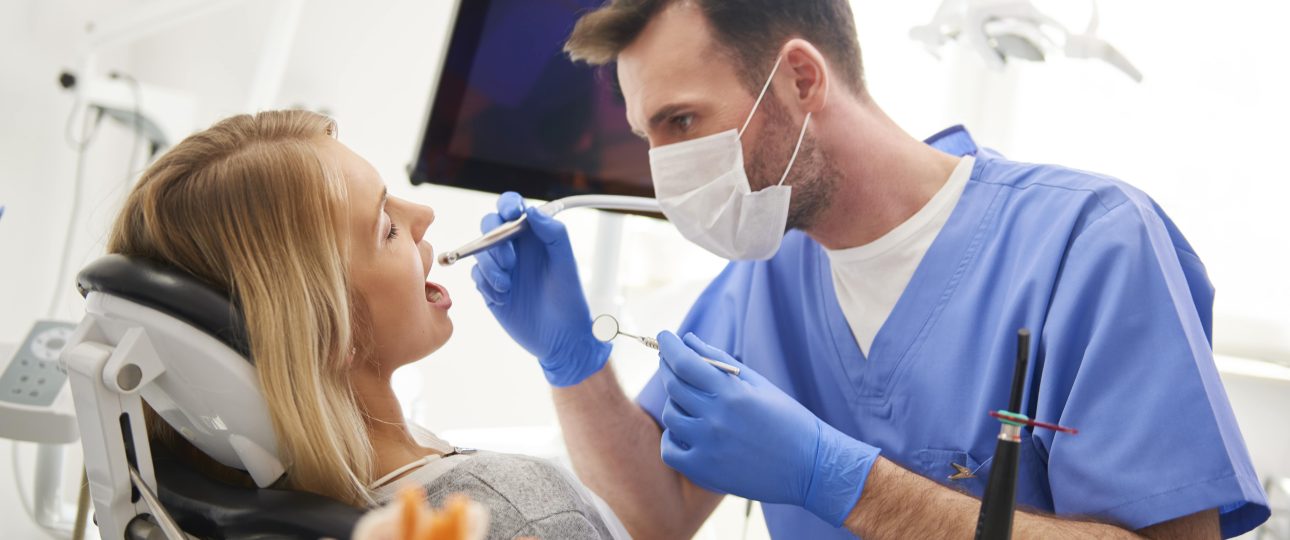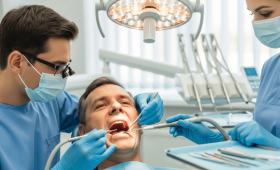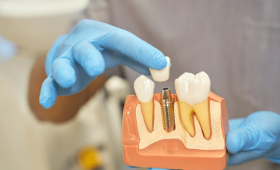What is the Average Cost of a Single Tooth Implant?
The average cost of a single dental implant in Hungary can vary widely depending on the city, the brand of implant used, and the experience of the dentist. Generally, the price for a complete package, which includes the implant itself, the surgical procedure, and the final porcelain or zirconia crown, ranges between €400 and €1000. However, this pricing does not include additional treatments (such as bone grafting), and the final cost can only be determined after a personal consultation, as the treatment plan is tailored to the individual.
Why are the Prices in Hungary So Affordable?
The main reason dental implant prices in Hungary are so affordable is that the general cost of living and business expenses are much lower than in many Western European countries. This allows dental clinics to keep their labor, rent, taxes, and insurance costs at a more reasonable level. However, this price advantage does not mean a compromise on quality. Clinics in the country generally use the latest technologies and internationally recognized implant brands. As a result, patients can receive high-quality service at a more affordable price.
How is the Total Budget for Treatment Calculated?
Calculating the total budget for the treatment is not just about the cost of the implant itself. First, a comprehensive examination and radiological assessment are performed. Then, decisions are made on the number of implants, the implant brand, and the type of prosthesis to be placed. If additional surgical procedures are required, such as for bone deficiency (bone grafting, sinus lifting), these costs are added to the total price. Finally, travel expenses such as airfare, accommodation, food, and local transportation should also be included in your budget.
Do Prices Vary from City to City?
Yes, dental implant prices in Hungary can show slight differences from city to city. Budapest, the capital, is one of the most developed and in-demand cities in the country, so prices may generally be slightly higher than in other cities. However, this difference is not significant enough to cause a major budget change. It is possible to find more competitive prices in clinics in smaller cities like Györ, Szeged, or Debrecen, although these clinics also often adopt similar pricing policies to attract international patients.
Is There a Price Difference Between State Hospitals and Private Clinics?
It is difficult to find dental implant treatment in state hospitals in Hungary, as these services are typically offered by private clinics. State hospitals focus more on basic dental health services, and aesthetic and advanced treatments like implants are usually not covered. Therefore, most international patients and locals prefer to work with private dental clinics that offer faster service, modern technology, and personalized treatment plans. The pricing in these clinics is determined by the quality of service and the comfort provided.
How Much Do Full-Arch Implants Like All-on-4 or All-on-6 Cost?
Full-arch implant solutions, known as All-on-4 or All-on-6, aim to replace all of a patient’s teeth in a single procedure. The cost of these treatments is much higher than that of a single implant, generally ranging from €2,500 to €7,000 for a single jaw. This price includes the implants, the surgical procedure, and the permanent prostheses (bridge or full denture). These solutions are an ideal and long-lasting option for patients who have lost all their teeth or are experiencing severe dental problems.
What is the Price Difference Between a Single Tooth Implant and an Implant-Supported Bridge?
A single tooth implant is a solution designed to replace a missing tooth and includes the cost of the implant, abutment, and crown. An implant-supported bridge, on the other hand, consists of a bridge placed on two or more implants for patients missing multiple teeth. The cost of an implant-supported bridge will be higher than a single implant because it is calculated based on the number of implants used. Generally, a three-tooth bridge placed on two implants can cost more than twice the price of a single implant.
How Does the Implant Brand Affect the Price?
Dental implant brands are one of the most important factors determining costs. Premium brands of Swiss or German origin such as Straumann, Nobel Biocare, and Astra Tech have higher prices. These brands are known for their long-term reliability and scientifically backed success rates. In contrast, newer and popular brands from South Korea or other countries may be more affordable. Clinics usually offer options to select the brand that best suits the patient’s budget and health condition.
Is the Dentist’s Experience and Expertise Included in the Price?
The dentist’s experience, expertise, and the prestige of the clinic directly affect the pricing. A dentist who is specialized, has years of experience, and holds international certifications can naturally charge a higher fee for their services. This is of great importance for ensuring that the patient’s treatment is completed reliably and successfully. When comparing price quotes, it is wise to pay attention not only to the cost but also to the dentist’s resume and previous successes.
Do the Types of Materials Used Change the Price?
Yes, the type of materials used for the implant and crown significantly affects the price. Implants are generally made of titanium, but in some cases, zirconia implants may also be preferred. Zirconia is a more expensive option due to its biocompatibility and aesthetic appearance. For the crowns placed on the implant, metal-supported porcelain or full-ceramic (zirconia) crowns can be used. Full-ceramic crowns are more aesthetic and therefore more costly due to their light transparency and natural appearance.
How Much Do Additional Treatments Increase the Cost?
In some cases, there may not be enough bone volume or a suitable sinus cavity for the implant to be placed. In such situations, additional surgical procedures like bone grafting (creating bone with bone powder) or sinus lifting (lifting the sinus cavity) may be required. These procedures can be performed before the implant surgery or in the same session. The cost of these additional treatments varies according to the complexity of the case and can add hundreds of Euros to the total price. Therefore, a detailed treatment plan prepared after a thorough examination is of great importance.
Are Digital Planning and 3D Imaging Included in the Price?
Digital planning and 3D imaging (CT scan) are an indispensable part of modern implant treatment. These technologies allow the dentist to examine your bone structure and nerve channels in great detail. This ensures the implant is placed in the most accurate position, and potential risks are minimized. Most reputable Hungarian clinics include these services in the initial consultation and price quote stage. This way, patients can see the entire process and cost transparently before the treatment begins.
Is There a Price Difference Between Local and General Anesthesia?
Local anesthesia is the most commonly used method during implant surgery and is generally included in the price. The area to be operated on is numbed, and the patient remains awake during the procedure. General anesthesia may be preferred for more complex cases, for placing a large number of implants, or for patients with phobias. General anesthesia requires an anesthetist team and special equipment, which can significantly increase the total cost. The cost of this option varies depending on the duration of the treatment and the anesthesiologist’s fee.
What is the Cost of Temporary Prostheses?
The process of the implant fusing with the bone (osseointegration) can take several months. During this time, temporary prostheses or temporary teeth can be used to meet aesthetic and functional needs. Temporary prostheses can be included as part of the treatment plan or offered as a separate cost. They are usually made of plastic material and prevent you from being toothless until the permanent prostheses are placed.
Is the Porcelain Crown Cost Calculated Separately?
Implant treatment generally consists of two main stages: the surgical placement of the implant and the placement of the permanent crown after the healing process. Many clinics price the cost of these two stages separately to ensure transparency. The “implant” price usually includes only the surgical part, while the “crown” price covers the cost of the permanent prosthesis. This distinction helps patients manage their budget better and make more informed decisions during the process.
How Do Travel and Accommodation Expenses Affect the Total Cost?
While implant prices in Hungary are affordable, you should not ignore travel and accommodation expenses when calculating your total budget. Especially in popular tourist cities like Budapest, accommodation costs can increase depending on the season. Since the treatment process may require more than one visit, it is important to calculate the costs of airfare, hotel stays, local transportation, and food and drink for each trip. These additional expenses can slightly reduce the attractive price difference initially, so it is necessary to consider them during the planning phase.
What Do “All-Inclusive” Implant Packages Include?
Some Hungarian clinics, especially for international patients, offer “all-inclusive” implant packages. These packages may include the implant surgery, the implant material used, the permanent crown, and sometimes even necessary additional surgical procedures (such as simple sinus lifting or bone powder application). In addition, services like airport transfers, accommodation support, and interpretation services during the treatment may be included in these packages. These packages are quite popular as they make costs predictable and simplify travel planning for patients.
What are the Advantages and Disadvantages of the Packages?
The biggest advantage of all-inclusive packages is that the total cost is known from the beginning, and the risk of encountering surprise costs is low. These packages greatly simplify treatment and travel planning, especially for patients coming from different countries. However, a disadvantage of these packages is their limited flexibility. For example, if you prefer a specific implant brand or material, going outside the package may lead to additional costs. Therefore, it is important to carefully examine the services and materials offered by the package.
Are Airport Transfers and Interpretation Services Included in the Price?
Many Hungarian clinics targeting international patients offer airport transfers and interpretation services free of charge to make the treatment process more comfortable. These services are a great convenience, especially for patients who do not speak Hungarian, and ensure communication during the treatment. To find out if these services are included in the price, it is important to contact the clinics and compare the price quotes based on whether these services are included or not.

Are There Payment Options and Installment Plans?
Dental clinics in Hungary generally offer various payment options. Most clinics accept payments in cash, by credit card, or via bank transfer. Some clinics may offer installment plans or allow payments to be divided according to the treatment stages, especially for high-cost treatments. However, installment plans are usually provided through local banks or financial institutions, so they may be limited for international patients. It is helpful to clarify the payment terms with the clinic before starting the treatment.
Is the Pre-Treatment Consultation and Examination Fee-Based?
The pre-treatment consultation and examination are the most critical stages of implant treatment planning. During this process, the dentist evaluates the patient’s overall oral health, takes X-rays or a CT scan, and determines the most suitable treatment plan. Most reputable Hungarian clinics offer this initial consultation and examination for free for international patients, and some may not even charge for digital X-ray images. However, it is important to inquire in advance to confirm whether these services are subject to a fee.
Are Warranty or Insurance Options Offered?
Reputable clinics in Hungary offer a warranty on the treatments they perform and the materials they use. These warranties can be lifelong for the implant itself but are limited to a certain period (e.g., 5-10 years) for the prostheses placed on it. The warranty generally covers defects related to material or workmanship. In the event of a possible complication, clinics may provide free correction services under the warranty. However, for the warranty to be valid, regular check-ups may be required.
How Do Hungarian Prices Compare to Those in Turkey?
Hungary and Turkey are leading countries in the field of dental tourism. Dental implant prices in Turkey are similar to those in Hungary or may even be more affordable in some cases. However, when making a price comparison, it is important to pay attention not only to the figures but also to the quality of service offered by the clinic, the dentist’s experience, and the brand of materials used. It can be said that both countries provide services at international standards, but personal preferences and case complexity can create price differences.
What is the Level of Implant Quality in Hungary?
Hungary has a long-standing tradition and a high reputation in the field of dentistry. Dentists in the country have generally received international training and closely follow the latest technologies. In Hungarian clinics, premium implant brands recognized worldwide (e.g., Straumann, Nobel Biocare) are widely used. This indicates that the quality of treatment and success rates are quite high. Therefore, there is no need to worry about the quality of implants in Hungary.
Are European Union Standards Applied?
Yes, as Hungary is a member of the European Union, its health services are subject to the EU’s strict regulations and standards. This means that dental clinics must maintain high standards regarding hygiene, sterilization, and treatment methods. All medical devices, implants, and materials used must have CE (Conformité Européenne) certification. This is a source of assurance for patients and indicates that the treatment is of internationally recognized quality.
What is the Language Proficiency of the Dentists?
In Hungary, where dental tourism is well-developed, the English language proficiency of dentists and clinic staff is quite high. To ensure that international patients are comfortable, many clinics also have staff or interpreters who provide services in other languages like German, French, and even Russian. It is beneficial to request an interpreter’s service, especially in complex cases, to prevent any misunderstandings during the treatment process.
How Can One Find References and Patient Reviews?
When choosing a clinic, it is very important to look at references and patient reviews. You can find such reviews online on various dental tourism platforms, in patient stories on the clinic’s own website, and on social media accounts. Reliable and independent review platforms (like Google Reviews, WhatClinic) are more useful as they reflect real patient experiences. Additionally, a clinic that offers the opportunity to contact former patients is a good sign of transparency and trustworthiness.
What Can Be Said About Price Transparency?
Reputable dental clinics in Hungary place great importance on transparency in pricing. After the initial examination and evaluation, a detailed and written price quote containing all cost items is usually provided to the patient. This quote clearly specifies the costs of the implant, crown, anesthesia, additional surgical procedures, and all other expenses. This way, patients can clearly see what the total cost will be before the treatment begins, and the likelihood of encountering surprises is reduced.
How Long Does the Treatment Process Take?
The duration of implant treatment can usually extend from a few months to a year due to the process of the implant fusing with the jawbone (osseointegration). In the first stage, the implant placement procedure is performed, which is usually completed in a single day. After this procedure, a waiting period of 2 to 6 months is required for the jawbone to heal and the implant to become stable. In the final stage, the permanent crown is placed. Therefore, the total treatment process usually requires more than one trip.
Can the Entire Treatment Be Completed in a Single Trip?
Generally, the entire implant treatment cannot be completed in a single trip. The main reason for this is the healing and fusion period of the implant with the jawbone (osseointegration). This process is of critical importance to ensure the implant is long-lasting and healthy and should not be rushed. However, thanks to some advanced technologies and special procedures (immediate loading), in some cases, temporary teeth can be placed in a single trip. For a fully permanent prosthesis, it is usually necessary to plan for at least two separate visits.
What is the Cost of Post-Implant Care and Check-ups?
Regular maintenance and check-ups are vital for the longevity of the implant. These check-ups are necessary for the dentist to evaluate the health of the implant and surrounding tissues. Most clinics may offer one or two free check-up sessions within the first year following the implant placement. However, a separate fee may be charged for check-ups or necessary cleaning procedures after this period. Obtaining information about these costs in advance is beneficial for your long-term budget planning.
Who Covers the Cost of Possible Complications?
As with any medical procedure, there is a risk of complications in dental implant treatment. Reputable clinics generally correct complications resulting from a material defect of the implant or a problem arising from the surgical procedure for free under warranty. However, the cost of problems caused by the patient’s failure to maintain oral hygiene or follow the dentist’s advice may be the patient’s responsibility. Therefore, it is important to carefully read the warranty terms and follow the dentist’s instructions.
How Does the Follow-up Process Work After Returning to Turkey?
Patients who receive implant treatment in Hungary usually continue the follow-up process with their own dentist in Turkey after returning. The clinic in Hungary can provide the patient with a detailed report and X-ray images about the treatment process. These documents help the dentist in Turkey facilitate the follow-up. Ideally, it is also important to have a communication channel to stay in touch with the Hungarian clinic and report any potential issues.
Are Additional Costs Like Airfare and Visa Included in the Total Budget?
Airfare and visa expenses are generally not included in the treatment cost. These expenses are travel costs that must be covered from the patient’s own budget. Since Hungary is in the Schengen Area, Turkish citizens must obtain a visa if they do not have a green passport. Therefore, additional expenses such as airfare, visa fees, travel insurance, and accommodation are important items that should be considered in the initial stage of treatment planning.
Can There Be Hidden Costs and How to Avoid Them?
Unfortunately, in some cases, hidden costs may arise. This can happen especially in clinics that do not have an all-inclusive package or are not sufficiently transparent. For example, items like X-ray fees, anesthesia costs, or temporary prosthesis fees may not have been included in the initial price. The best way to avoid this is to get a written price quote before the treatment and ensure that all items are clearly specified in this quote. Additionally, obtaining and comparing price quotes from different clinics can also be beneficial.



